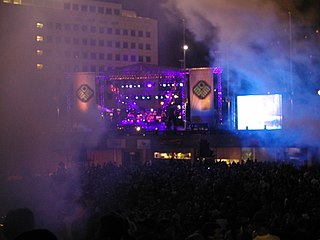Detroit techno is a type of techno music that generally includes the first techno productions by Detroit-based artists during the 1980s and early 1990s. Prominent Detroit techno artists include Juan Atkins, Eddie Fowlkes, Derrick May, Jeff Mills, Kevin Saunderson, Blake Baxter, Drexciya, Mike Banks, James Pennington and Robert Hood. Artists like Terrence Parker and his lead vocalist, Nicole Gregory, set the tone for Detroit's piano techno house sound.

Juan Atkins, also known as Model 500 and Infiniti, is an American record producer and DJ from Detroit, Michigan. Mixmag has described him as "the original pioneer of Detroit techno." He has been a member of the Belleville Three, Cybotron, and Borderland.

Movement Electronic Music Festival is an annual electronic dance music event held in the birthplace of Techno, Detroit, each Memorial Day weekend since 2006. Previous electronic music festivals held at Hart Plaza on Memorial Day weekend include Detroit Electronic Music Festival (2000–2002), Movement (2003–2004) and Fuse-In (2005). The four different festival names reflect completely separate and distinct producers, brands and directions. All of these festivals presented performances by musicians and DJs that emphasized the progressive qualities of the culture surrounding electronic music including the celebration of Detroit being the birthplace of the popular electronic music subgenre Techno.

Derrick May, also known as Mayday and Rhythim Is Rhythim, is an American electronic musician from Belleville, Michigan, United States. May is credited with pioneering techno music in the 1980s along with collaborators Juan Atkins and Kevin Saunderson, commonly known as The Belleville Three.
WGPR is a commercial radio station in Detroit, Michigan, broadcasting an urban contemporary radio format. Owned by the International Free and Accepted Modern Masons, its studios and offices are on East Jefferson Avenue on Detroit's lower eastside.

Carl Craig is an American electronic music producer, DJ, and founder of the record label Planet E Communications. He is known as a leading figure and pioneer in the second wave of Detroit techno artists during the late 1980s and early 1990s. He has recorded under his given name in addition to a variety of aliases, including Psyche, BFC, and Innerzone Orchestra.
Kevin Maurice Saunderson is an American electronic dance music DJ and record producer. He is famous for being a member of a trio, along with Juan Atkins and Derrick May, who came to be known as the Belleville Three, who are often credited to being among the pioneers and originators of techno: in particular this act helped define Detroit techno, the earliest style of this music genre. Born in New York, at the age of nine he moved to Belleville, Michigan, a suburb of Detroit, where at Belleville High School he befriended the other members of the trio.
Inner City is an American electronic music group that formed in Detroit, Michigan, in 1987. The group was originally composed of the record producer and composer Kevin Saunderson and the Chicago, Illinois, vocalist Paris Grey. Saunderson is renowned as one of the Belleville Three—along with Juan Atkins and Derrick May—high school friends who later originated the Detroit techno sound. In February 2018, Billboard magazine ranked them as the 69th most successful dance artists of all-time.
WDVD is a hot adult contemporary radio station in Detroit, Michigan. Owned and operated by Cumulus Media, WDVD's studios and offices are located in the Fisher Building in Detroit's New Center district near downtown, while its transmitter is located in Royal Oak Township at 8 Mile Road and Wyoming Avenue.
WAAM is a commercial radio station in Ann Arbor, Michigan, known as "WAAM RADIO". It is owned by Coolarity A2, LLC, and broadcasts a talk radio format. The radio studios and offices are on Packard Road in Ann Arbor.

WKQI is a commercial radio station licensed to Detroit, Michigan, featuring a top 40 (CHR) format known as "Channel 955", pronounced "nine-five-five". Owned by iHeartMedia, the station serves Metro Detroit and much of Southeast Michigan and southwestern portions of Ontario, including Windsor. The station's studios are located in Farmington Hills, while the transmitter is located in Oak Park, Michigan, on 10 Mile Road near Greenfield Road. In addition to a standard analog transmission, WKQI broadcasts over HD Radio using the in-band on-channel standard, and is available online via iHeartRadio.
WDKL is a contemporary Christian formatted radio station licensed to Mount Clemens, Michigan, and serving the Detroit metropolitan area. The station is owned by Educational Media Foundation. The station broadcasts with 50,000 watts of power from an antenna located Northeast of the intersection of Gratiot Avenue and Fourteen Mile Road in Clinton Charter Township, Macomb County, Michigan, and directs its signal mainly toward the north and east to avoid interfering with WWWW-FM in Ann Arbor.

The Belleville Three are three American musicians, Juan Atkins, Derrick May, and Kevin Saunderson, who are credited with inventing the Detroit techno genre in Belleville, Michigan.

Stacey Pullen is an American techno musician based in Detroit, Michigan, United States.
Techno is a genre of electronic dance music which is generally produced for use in a continuous DJ set, with tempos being in the range from 120 to 150 beats per minute (BPM). The central rhythm is typically in common time (4/4) and often characterized by a repetitive four on the floor beat. Artists may use electronic instruments such as drum machines, sequencers, and synthesizers, as well as digital audio workstations. Drum machines from the 1980s such as Roland's TR-808 and TR-909 are highly prized, and software emulations of such retro instruments are popular.
The Parade Tour was a concert tour by American recording artist Prince in support of Prince and The Revolution's eighth studio album Parade and his 1986 film Under the Cherry Moon. The Hit n Run Tour was not a full scale American tour, but a string of concerts that was dubbed "Hit n Run" by Prince's manager. Most of those shows were announced days or hours before the actual concert took place. The Parade Tour marked the first full tour of Europe by Prince. It also saw the expanded Revolution line-up and featured Sheila E. and her band as an opening act for most shows.

Detroit, Michigan, is a major center in the United States for the creation and performance of music, and is best known for three developments: Motown, early punk rock, and techno.

Techno! The New Dance Sound of Detroit is a 1988 compilation of early Detroit techno tracks released on the Virgin Records UK imprint 10 Records. The compilation's title helped establish the term "techno" as the name for electronic dance music emerging out of Detroit in the 1980s.

"No UFO's" is a 1985 techno song by Juan Atkins under the alias of Model 500. It was released on Atkins own label Metroplex. The song was the first track released after the split of Atkins' previous group Cybotron. The music followed similar themes of the previous group with science fiction and alienation but featured less of a song structure than Cybotron's music leading the track to be often identified as one of the earliest techno songs.

Jennifer Witcher is a house and techno DJ and Producer born in Detroit, founder of the DJ collective 'Women on Wax', and accompanying record label 'Women on Wax Recordings'.










